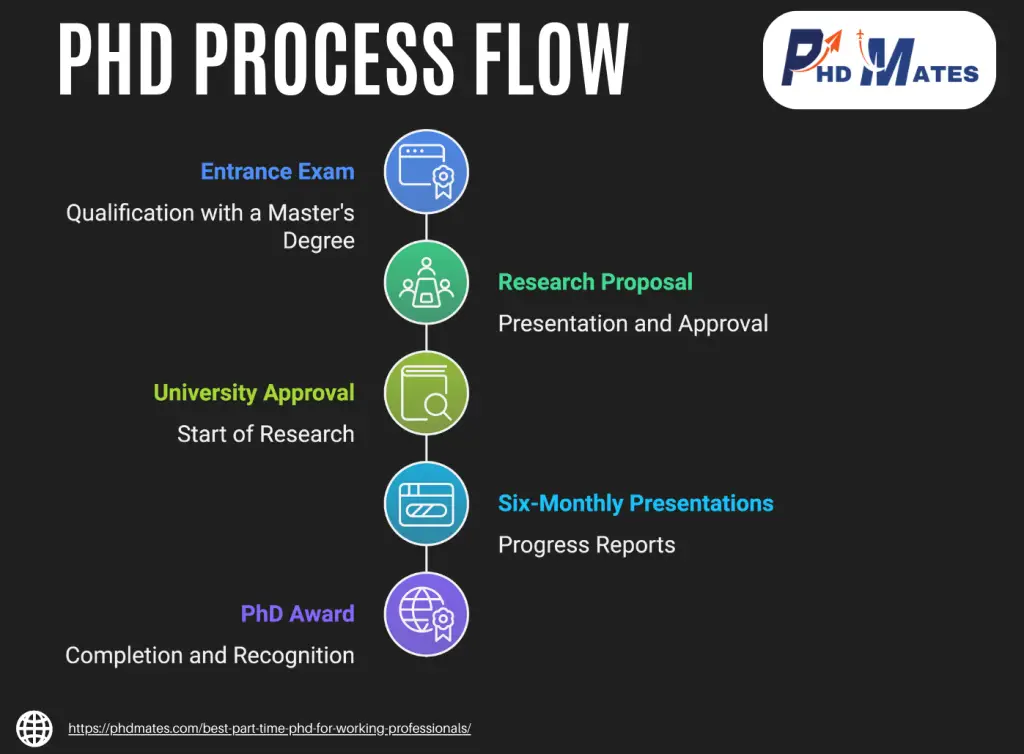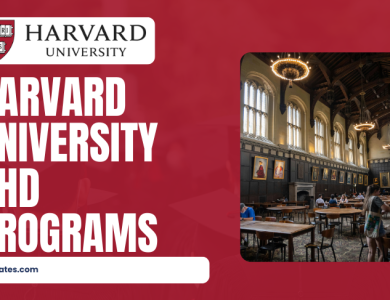12 Best Part-Time PhD for Working Professionals in India 2025

There was a time when a PhD was considered to be very difficult. People used to think that it required lots of dedication and knowledge; only the best-minded personalities should pursue a PhD. But today, the times have changed, and more people want to pursue a PhD, be it for research or for just putting Dr. in front of their name. Talking about today, more people pursue a PhD while working rather than being full-time PhD scholars.
With more and more universities providing PhD opportunities, it has become very accessible for any working professional to continue pursuing education.
With the growing importance of a PhD, many corporate working professionals prefer to gain admission to a PhD program. For better promotions and opportunities, professionals today enroll in PhD programs.
If you are reading this article you should be having questions such as – Whether one should pursue a PhD as a working professional? What is the best Part Time PhD for Working Professionals? Which universities should you apply?
Contents
How to Pursue a Part-Time PhD in India?

Although a PhD is a full-time degree, there are no regular classes, lectures, or practicals that students must attend. Upon successful admission to a PhD program in India, students are appointed under the guidance of a PhD supervisor. The supervisor provides support and direction throughout the research journey.
PhD scholars do not have to meet with their supervisor daily, but regular meetings or updates on progress are expected. However, working professionals can provide updates, queries, and findings virtually. Additionally, it is recommended to schedule personal meetings with the supervisor periodically.
Unlike undergraduate programs, PhD programs do not typically involve exams or a grading system. However, in India, every university requires students to submit six monthly progress reports. These reports must be presented to the research center and a university panel every six months.
1. Give PhD Entrance Exam
To be qualified for PhD admissions, you need to have a master’s degree with a qualifying percentage of more than 55%. After which, the very first step that is involved is to take the PhD entrance test/exam. Every university has its own entrance exam that you may need to take. So, you need to keep track of the PhD entrance test of the university to which you want to take admission.
The syllabus of the PhD entrance test could differ from university to university. Still, the basic pattern of the syllabus involves research methodology, governance, education, English and communication in part I, while part 2 contains subject-specific questions.
If you are SET / NET qualified or have a post-graduate degree of M.Phil, you are not required to take the PhD entrance exam and directly go for interview rounds. NET or National Eligibility Test is conducted by the Central Government (UGC). At the same time, the state government carries out the SET or State Eligibility Test.
2. Select a Research Centre or Guide
University may have many research centers where you can further carry out your research degree. You need to select a research center and a PhD guide under whom you would further carry out your PhD degree. After providing or selecting the research center and guide, the research center may schedule your interview.
Further rounds of admission may be carried out by the research center, which may involve the submission of your research proposal and personal interview.
3. Research Proposal.
On a given date, the research centre will interview the candidate who wants to pursue a PhD. The research centre will verify all the documents and carry out the further process which may involve the presentation of your research proposal.
The panel consists of academicians and researchers who are part of the University. The panel goes through your proposed topic for your PhD. After the successful presentation and selection of the candidate, the research Centre sends the selected candidate’s research proposal, and topic to the university for approval.
4. University approval.
The Board of Studies of the University goes through your research proposal, they will approve the topic after which you can start your research. You should present six-monthly presentations to your research center, which again involves a panel.
5. Get Awarded With PhD
Typically, a minimum of three years is required for a PhD in social sciences (literature, history, arts, commerce, humanities, management, etc.) after you have completed your six-monthly presentations, pre-VIVA, and VIVA.
You will be successfully awarded a PhD degree, after which you are qualified to call yourself Dr.
Best Part-Time PhD for Working Professionals
With the rise in private universities, working professionals now have more opportunities to pursue academic degrees. The flexibility of pursuing an academic degree while working is an added advantage.
While it’s possible to obtain a PhD degree from a public university, it’s generally preferred to do so from a private university. The degree you receive from either a public or private university will be equally valid, as both are approved by the UGC.
I have curated the list of universities where you can pursue a part-time PhD while having a job-
| Sr. No. | Name of the University | Fees (Per Year) | Field of Study | Eligibility (Any One) |
|---|---|---|---|---|
| 1. | Symbiosis International | ₹50,000 |
|
SIU PET |
| 2. | NMIMS University | ₹50,000 |
|
NMIMS Entrance Test, GATE, SET, NET |
| 3. | Savitribai Phule, Pune University | ₹35,000 | PET, NET, SET | |
| 4. | Delhi University | ₹4,400 |
|
UGC-NET (including JRF), UGC-CSIR NET, AYUSH-NET, DBT-JRF, ICMR-JRF, DST-INSPIRE, GATE, SET |
| 5. | Bangalore University | ₹32000 |
|
KSET, KSLET, NET, PET, M.Phil |
| 6. | NIL |
|
GRE, GMAT, UGC-JRF, ICAR-SRF |
|
| 7. | IIT Delhi | ₹30,000 |
|
GATE, NET, PET |
| 8. | IIT Bombay | ₹37,000 |
|
|
| 9. | Dr. D Y Patil Vidyapeeth, Pune | ₹80,000 |
|
UGC, ICMR, DBT / DST, CSIR, AYUSH-NET-JRF, AICTE-GATE, AYUSH, INSPIRE |
| 10. | Chandigarh Universe | ₹1,40,000 |
|
GATE, NET |
| 11. | BITS, Pilani | ₹1,00,000 |
|
Written Test & Interview |
| 12 | Lovely Professional University | ₹1,00,000 |
|
UGC (NET/ JRF)/ CSIR (NET/ JRF), GATE, GPAT, LPUNEST |
My Thoughts
Pursuing a PhD as a working professional is possible with flexible programs offered by private universities. The process involves taking an entrance exam, selecting a research center and guide, presenting a research proposal, and obtaining university approval. Private universities provide a more accessible and flexible approach to PhD studies for working professionals.
As a working professional, private universities offer more flexibility in work and research, providing a different perspective on research and observing small changes. Upon completing your PhD, you’ll have numerous career opportunities open to you.
I’d be delighted to help you with your PhD admission. Please mention them in the comment section or fill out the Contact Us form.
